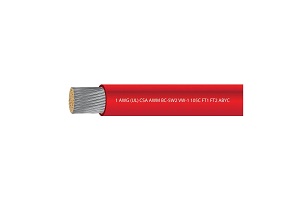
What Makes AWG Marine Battery Cable Suitable?
Boaters may be familiar with the following wording, especially if they are particularly handy, although others might need a little insight into what it means. The term in question in AWG marine battery cable and it might sound fairly simplistic, but there is a little bit of special care that goes into it that makes it useful for a given set of conditions.
For example, you might think that you could use just any regular copper battery cable for marine connections or for the wiring throughout a boat. Theoretically, you could, but there are a number of features of marine battery cable that make it more useful under certain conditions than single conductor copper wire that has not been specially treated or designed for use at sea.
First off, the term AWG simple means American Wire Gauge and it signifies the system for measuring the cross-sectional area of a given wire or cable. Without getting into the mathematical operation of what it means or how it is determined, what you need to know is that a larger number indicates a thinner, smaller wire, whereas a smaller number indicates a larger, more robust wire. Also, for all intents and purposes, a larger, thicker wire, all other things being equal, can work with a higher ampacitythan thinner wire, although you would have to be familiar with the actual rating of a specific, given wire to assure safety.
Beyond the term AWG, there are two specific things that make marine battery cable useful around water, specifically around saltwater. If you are looking at wires or cables and you see a cable that appears silvery and has many, many finely stranded conductors, there is a chance you are looking at marine battery cable.
The reason for this is that marine battery cable is made up of a very high count of very fine copper conductors that are cabledtogether. In addition, these conductors are each individually tinned, which gives them the silvery tone mentioned above.
First, we will investigate the value of the fact that they have such a high strand count in their construction. Marine battery cables must not only bend around tight corners and into the far reaches of boats and ships, but they must also be able to the constant motion of the boat, whether from the waves or from the vibration of the engines. This places a great deal of stress on the structural components of a boat, wires and cables included. Therefore, the high strand count provides these cables with the greatest deal of flexibility possible to make their use suitable at sea.
As far as the individual tinning of the copper conductors, this has to do with their resilience in the face of the elements. Only take a moment to reflect on the conditions with which wires and cables will have to contend at sea. Saltwater is dangerously corrosive, and native copper is impressively reactive. Combine the two, and you will have cables that are not of much use in short order. Therefore, AWG marine battery cables are tinned in order to give them a fighting chance against the elements.
That’s just about what goes into the making of marine-grade, tin-plated, copper stranded cable and why they are made the way they are. If, on the other hand, you are looking for some for your trade or even for your personal boat, you can find them easily online at EWCSWire.com. There you will find a number of these cables that are more than suitable to resist corrosion and work for the wiring in many different marine settings. Check out their online catalog, and if you have any questions, give them a call at 800-262-1598.
For more information about Belden 8760 and Belden 8723 Please visit : Electric Wire & Cable Specialists (EWCS).
